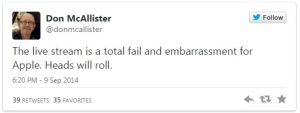Like hundreds of millions of others, I enthusiastically tuned in to watch the Apple Launch event yesterday.
And like hundreds of millions of others, I was frustrated by a the spectacular failure of the live-streaming of the event, which stuttered, error-messaged restarted, over-dubbed Chinese real-time translation, and regularly reverted to a bizarre test-card of a Truck Schedule.
Very un-Apple-like. Very embarrassing.
Needless to say, Twitter was in uproar baying for retribution; this tweet summarising the mood.
When things go publicly wrong, this is so often the reaction. We look for the fall-guy and take ‘decisive action’.
Does this change anything? Does it reduce the risk that the source of the failure will repeat it in the future? I don’t believe so.
Somewhere out there, there are one or more totally committed Apple employees who have experienced the most agonizing, unforgettable public professional moment of shame. They probably worked through the night for weeks in advance to make this a success – and somewhere, someone screwed up, in front of one of the largest audiences in the world. Does anyone really think they would want to re-live that experience? Does anyone think that they – more than anyone else – will want to know who, when and why this failure happened?
So why would any sane organisation want heads to roll after such a one-off failure?
Because the trouble is, when heads roll, knowledge and experience rolls too.
All this reminds me of an apocryphal story from IBM – one which I often use to illustrate true cost of failure – failing to learn from it.
A sales executive was working on a big deal for IBM – around $10m of potential value. Somewhere along the way, they screwed up and lost the deal to a competitor. That was a big deal.
The salesperson was summoned to Lou Gertsner [or perhaps his predecessor CEO, John Akers?] to explain himself. After hearing the explanation, Gerstner asked the salesperson, “What do you think I should do?”.
“Well, I guess you’re going to fire me.” came the faltering response.
“Fire you? Why would I fire you when I’ve just invested ten million dollars in your education?” retorted Gerstner.
Now that’s knowledge leadership in action.
I hope that today, intelligence triumphs over indignation at 1, Infinite Loop, Cupertino, and Apple are smart enough to do the same.


September 10, 2014 at 12:40 pm
Hi Chris great story as a fellow Apple fan I was frustrated by the feed yesterday – still it was good to have a sense of deja vu. The IBM story is actually older than that and goes back to the 1940’s and their chairman Thomas Watson Jr. There are some great quotes from him at IBM archives, that are still relevant to KMers and managers alike https://www-03.ibm.com/ibm/history/exhibits/watsonjr/watsonjr_quoted2.html
My particular favourite is the one from 1957 at the top about forgiving mistakes which is highly pertinent to your post
December 15, 2017 at 5:20 am
“Hello,